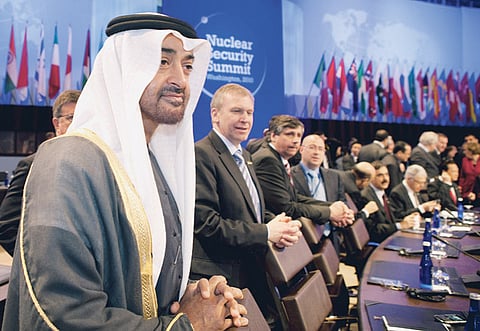Leaders united on nuclear stance
Resolve to keep plutonium and enriched uranium out of terrorists' hands

Washington: Leaders of 47 countries on Tuesday assembled to recharge efforts to keep nuclear material out of terrorist hands as President Barack Obama opened the summit by declaring that the risk of an attack has increased.
He called the conference with the goal of locking down all nuclear materials worldwide in four years.
European Union President Herman van Rompuy called on all countries to sign and ratify the convention on the 1980 Physical Protection of Nuclear Material, which was amended in 2005 to require states to protect such materials even when not in transit.
"Nuclear terrorism... represents a most serious threat to international security with potentially devastating consequences to our societies," Van Rompuy said.
On the sidelines of the conference, German Chancellor Angela Merkel said she was "very content with the progress" made.
"This is a first, important step to react to new, so far unknown threats," Merkel said according to the German news agency DAPD.
Obama and South Korean President Lee Myung-bak also announced that South Korea will host the next conference of this kind in two years.
North Korea snub
Lee Myung-bak told reporters that North Korean leader Kim Jong Il will not get an invitation until the North gives up its nuclear weapons ambitions.
North Korea's efforts to build a nuclear weapon programme kept it out of the Washington conference.
The summit paid early dividends on Monday, the first day of the conference: China's agreement to work with the United States on possible sanctions against Iran and Ukraine's decision to rid itself of nuclear bomb-making materials.
The focus of the summit concerns tonnes of plutonium and highly enriched uranium believed to be insufficiently protected from international criminal gangs and terrorist organisations.
A new report from a Harvard nonproliferation expert, for example, finds that Pakistan's small but growing stockpile faces "immense" threats and is the world's least secure from theft or attack.
However, Pakistani Prime Minister Yousuf Raza Gilani said his country's nuclear weapons are well-guarded.
The summit ends Tuesday evening with a joint declaration to guide future work toward locking away and cleansing the globe of materials still too easily accessible to terrorists.
Sign up for the Daily Briefing
Get the latest news and updates straight to your inbox



